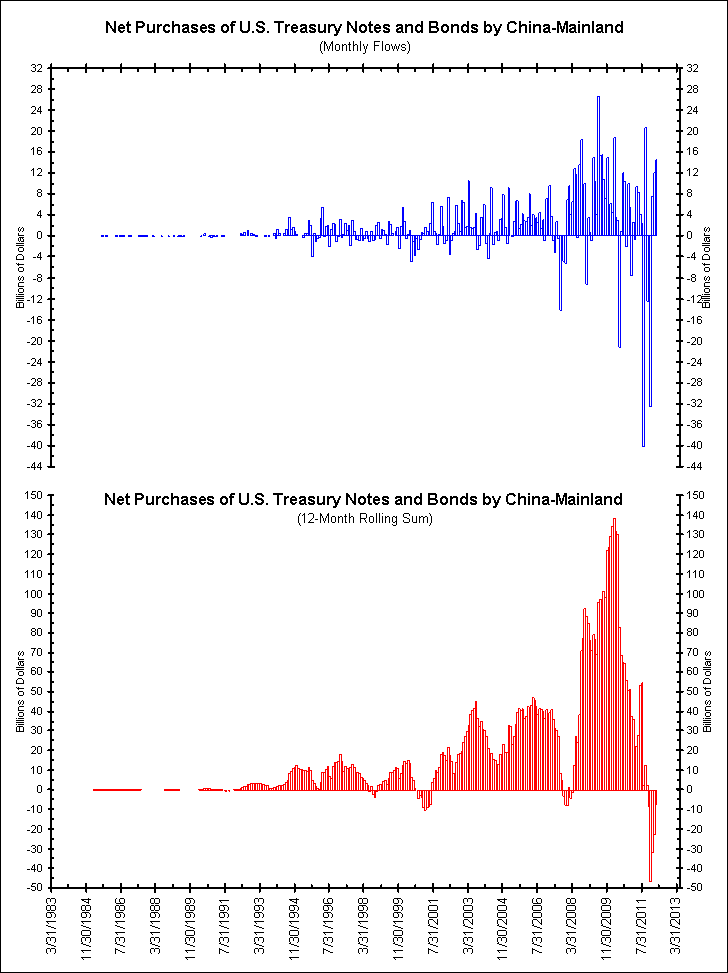古風無痕
世界的政經大勢;人生的歡喜怒罵;精神的上下求索。【古風按】最近(2012年5月21日),西方主流傳媒路透社爆出了一條令人震驚的消息(見下麵附錄的英文資料):美國財政部已經在去年的六月份賦予了中國央行(人民銀行)直接購賣美國國債的資格。大家可不要小看這個舉措喲,這其中僅僅從字麵上看就有三點極其重要的資訊:①隻有原始交易商(primary dealer)才有這種直接購賣美國國債的資格,而此資格以前一直被為數不多的超級大銀行(也就是國際金融資本的嫡係部隊)所壟斷。②原始交易商的地位本身除了擁有美國的國債發行政策的直接知情權(甚至還能直接參與政策的谘詢、製定、修訂)外,還有巨大的商業利益,因為原始交易商從美國財政部直接購買到美國國債後,即便不收取任何手續費,也仍然可以再用較高的價格轉手賣給其他的買家(包括美聯儲自己喔),隻要現行美元體係不倒,這就是保賺不賠的買賣!③中國央行現在是曆史上唯一一家享有這種待遇的國家央行,連美國自己的央行——美聯儲都沒有這個資格咧,更不消說其他國家(如日本)的央行了。
由於這折消息僅僅顯示出中國能夠直接購買美國國債的訊息,而並沒有很細致地討論中國拋售美國國債的課題,許多愛國的網友讀完消息後都在破口大罵中國政府的所謂賣國行徑。當然,愛國人士的擔憂是完全可以理解的,因為美國的7年國債利率現在已經在1%上下了(30年國債利率也降到了3%以下了),如果再把美元的貶值考慮進去,美國國債的實際利率早就是負值了。中國把自己的外匯儲備拿去買美國的國債,僅僅從利率的角度去考察的確是筆虧本的買賣。可是在下最後的定論前,在這裏麵有幾處很詭秘的疑點需要大家來進一步地思索:①如果中國買美國的國債肯定虧本,那麽中國剛剛獲得的原始交易商資格能夠消除中間商的多重克扣,是否能夠做到少賠了呢?(答案是肯定的吧)②如果中國用較低的“原廠批發價”買進美國國債再轉手以較高的價格賣出,是否能夠多賺點錢了呢?(答案當然是肯定的嘛)③如果中國的最高領導層都已經被國際金融資本所收買而在大搞賣國行徑,為何早已被美國軍事占領和被國際金融資本控製的日本沒有獲得原始交易商的待遇呢?難道日本政府還不夠賣國嗎?(答案很顯然是否定的啦)④如果中國作為美國國債的買家展現出旺盛的持續購買熱度,請問作為賣方的美國會自願給與中國如此優惠嗎?當然作為留住大客戶的VIP待遇的確在商場上經常遇到,可是為何美國僅僅給中國唯一的VIP待遇,而把同樣熱情的大客戶日本拋在了一邊呢?(答案自然是否定的)⑤既然持續的買進不會獲得VIP待遇,那麽中國是否在拋售美國國債而迫使美國發出史上絕無僅有的VIP卡了呢?(答案隻能是肯定的了)
通過上麵的層層邏輯推演,我們就能得出一個很明顯的結論:中國政府不僅沒有賣國、沒有被國際金融資本所控製,而且正在為中國的國家利益努力奮鬥!那麽有什麽證據表明中國在拋售美國國債呢?變現出來的錢又都到哪裏去了呢?答案就在下麵的四篇古風舊作和附錄的英文資料裏麵,請諸位讀者繼續閱讀:
古風解讀中國所持美債額度為何下降
http://blog.wenxuecity.com/myblog/46947/201204/8543.html
古風解說法國總統大選後效應及其避險要略
http://blog.wenxuecity.com/myblog/46947/201205/5517.html
關於投資理財的《古風八條》
http://blog.wenxuecity.com/myblog/46947/201205/6412.html
古風解讀摩根大通巨虧20億美元交易的內幕
http://blog.wenxuecity.com/myblog/46947/201205/13383.html
http://azizonomics.com/2012/05/23/is-china-really-liquidating-treasuries/
Is China Really Liquidating Treasuries?
by John Azis, Azizonomics, 23 May 2012
The news that China has become the first sovereign to establish a direct sales relationship with the U.S. Treasury (therefore cutting out the middleman and bypassing Wall Street) raises a few interesting questions.
From Reuters:
China can now bypass Wall Street when buying U.S. government debt and go straight to the U.S. Treasury, in what is the Treasury’s first-ever direct relationship with a foreign government, according to documents viewed by Reuters.
The relationship means the People’s Bank of China buys U.S. debt using a different method than any other central bank in the world.
The other central banks, including the Bank of Japan, which has a large appetite for Treasuries, place orders for U.S. debt with major Wall Street banks designated by the government as primary dealers. Those dealers then bid on their behalf at Treasury auctions.
China, which holds $1.17 trillion in U.S. Treasuries, still buys some Treasuries through primary dealers, but since June 2011, that route hasn’t been necessary.
The documents viewed by Reuters show the U.S. Treasury Department has given the People’s Bank of China a direct computer link to its auction system, which the Chinese first used to buy two-year notes in late June 2011.
The biggest Chinese outflows in U.S. Treasuries occurred in the months following the establishment of this relationship:
Which begs the question for some analysts — was China really selling? Or was China stealthily buying direct from the U.S. Treasury (unrecorded) and selling back into Wall Street (recorded)?
Well, according to the Treasury, the Treasury International Capital data seeks to record foreign holdings of U.S. securities, not just the flows, and given that the Treasury was the seller in these direct transactions (and so obviously was aware of them) there’s no reason to believe that they wouldn’t include any such direct outflows in the data. That suggests very strongly that yes, China really was selling.
And maybe the real reason that the Treasury offered China direct access (thus cutting out the middleman and offering China cheaper access than ever) was precisely because China was selling, and because the Treasury was concerned about the effect on rates, and wanted to give China some incentive to keep buying. As Jon Huntsman noted in a 2010 cable leaked by Wikileaks, the PBOC has felt pressured to keep buying, and as various PBOC officials have hinted in recent months, China is actively seeking to convert out of treasuries and into gold. And that makes sense — treasuries are yielding ever deeper negative real rates. People holding treasuries are losing their purchasing power. No wonder the treasury is willing to cut Wall Street out of the deal.
And it isn’t like the Treasury would have taken this move lightly — cutting Wall Street out of the equation is a slap in the face to Wall Street.
This raises a much more interesting question — now that the PBOC has effectively been upgraded to primary dealer status, would the Fed start buying treasuries directly from the PBOC in order to manage rates downward and prevent a spike in Treasury borrowing costs should China choose to quicken the pace of a future liquidation, potentially bursting the treasury bubble?





